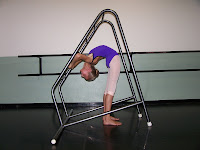A good example of assisted resistive stretching is for "Supine Leg Extensions" (which we call "Leg-Ups"). This is one of our dancers' favorite stretches!
Assisted Supine Leg Extensions (Standard)
1. Stretcher lies down on her back, on the floor (or on a mat) with legs facing partner.

2. Making sure that the leg to be stretched comes up straight over the torso, partner gently pushes leg towards head until finding the "point of tension" (the point at which significantly increased resistance is felt).
3. Partner asks stretcher to resist by pushing against the stretch (using the leg only) while partner maintains the stretched position firmly. Hold for 8 or 10-count.
4. Rest for 8 or 10-count.
5. Perform steps 3 and 4 for three iterations.
6. Partner tells stretcher to relax and not resist while partner pushes leg toward floor as far as it will go (or until stretcher says "Stop").
7. Repeat for other leg.
NOTES
a. Alignment is very important; keep body straight and stretch leg over front of body, not sides.
b. If the initial "point of tension" is too close to the head (i.e., if the stretcher's leg can go all the way down to the floor when "cold"), this exercise will not be very productive (see advanced variations of this exercise below).
c. Always start with the weaker leg ("bad side").
d. Partner should use one hand to keep other leg down and in proper position, if necessary.
Advanced Assisted Supine Leg Extensions (Variation-1)
1. Stretcher lies down on a raised bench with hips at the end (so that lower leg can angle down towards floor). The more flexible the stretcher, the larger the angle.
2. Follow the instructions for the standard exercise above.

Advanced Assisted Supine Leg Extensions (Variation-2)
1. Stretcher performs splits on the floor, in front of partner.
2. Partner firmly holds front leg by the ankle and lifts until "point of tension" is found, making sure stretcher's torso remains in contact with floor, hips are squared, legs straight. Note that this exercise can be performed for either front or back leg.

3. Partner keeps stretcher firmly in "oversplit" position and asks stretcher to resist by pushing down (with leg only) for 8 or 10-count.
4. Partner allows stretcher's leg to return on the floor (normal splits position) for 8 or 10-count.
5. Perform steps 2 to 4 for 3 iterations.
6. Partner tells stretcher to relax and not resist while partner lifts leg until stretcher says "Stop".


7. Repeat for other leg.
Resistive Stretching and Strengthening for Developpes and Arabesques
The following details steps for developpe to the front, but same principles apply to side developpes and arabesques.
A. Resistive - Positive
1. Stretcher stands at barre with one hand on the barre, facing partner.
2. Partner lifts leg as high as possible until the "point of tension" is reached.
3. Partner holds leg in place (stretched position) while stretcher pushes leg down for 8 or 10 counts.
4. Stretcher rests leg for 8 or 10 counts.
5. Repeat steps 2 to 4 for 3 iterations.
6. Partner tells stretcher to relax and not resist as partner lifts leg as high as possible (until leg touches touches wall behind stretcher, or stretcher says "Stop".
7. Repeat for other leg.
B. Resistive - Negative1. Stretcher stands at barre with one hand on the barre, facing partner.
2. Stretcher lifts leg as high as possible (where she can hold for 3 seconds).
3. Partner gently pushes down on leg while stretcher tries to lift higher for 8 or 10 counts.
4. Stretcher rests leg for 8 or 10 counts.
5. Repeat steps 2 to 4 for 3 iterations.
6. Repeat for other leg.




































